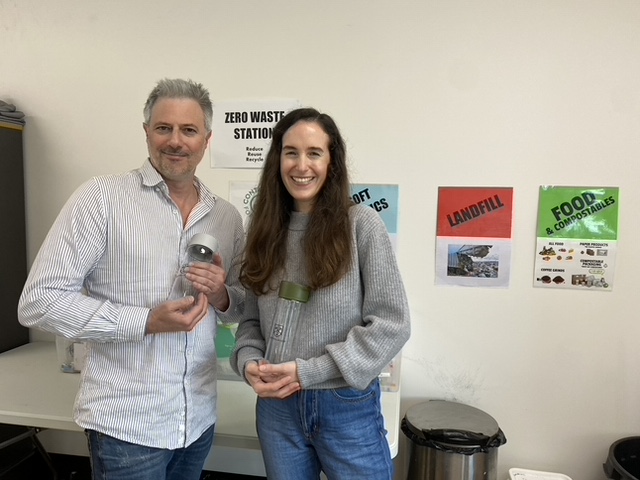The production of Jeffrey Walker’s The Portable Door reached an Australian eco-milestone, becoming the first local film to operate under the UK Albert-BAFTA sustainability system.
Designed for productions to both measure and reduce their carbon footprint, the program includes a Carbon Action Plan with criteria across communication and engagement; editorial content; production energy, materials, and waste; travel; and carbon-neutral production.
Environmental organisation Albert awards certification to productions judged to have successfully completed the plan, seen in the form of a badge that often appears in the credits.
The system was introduced to The Portable Door via finance partner Sky Studios, whose parent company Sky aims to be Europe’s first net-zero carbon entertainment company by 2030.
Filming wrapped last month on the adaption of Tom Holt’s six-part fantasy book series, which stars Christoph Waltz, Patrick Gibson, Sam Neill, Miranda Otto, and Chris Pang.
Waltz plays company CEO Humphrey Wells, who disrupts the world of magic by bringing modern corporate strategy to ancient magical practices, while Gibson plays Paul Carpenter, a lowly, put-upon intern who discovers the true agenda of the vast corporation where they work.
Leon Ford penned the screenplay, with Story Bridge Films’ Todd Fellman producing with the Jim Henson Company’s Lisa Henson and Blanca Lista.
The production was required to meet sustainability objectives, such as reducing plastic water bottle consumption, industrially composting food and packaging, and procuring ethical and sustainable products.

There were also efforts made to contribute to the circular economy and the local community by keeping valuable resources and materials out of landfill. This included donating wood to men’s sheds, foods to OzHarvest, and e-waste to Substation 33.
Other beneficiaries were Reverse Garbage, World’s Biggest Garage Sale, Indigenous organisations, local schools and kindergartens, Salvation Army, and many more.
Fellman told IF he was “incredibly proud” of the production’s sustainability measures.
“With a story that takes you on a fantastical journey from the heart of London to some of the most spectacular natural environments in the world, it was important for us to make a huge impact on our audience and zero impact on the planet,” he said.
“All our departments did a fantastic job embracing sustainable objectives to lighten our carbon footprint and help work towards our goal of being a carbon neutral production.
“We put in place a very effective waste management and composting program, plus reduced our meat consumption with the introduction of Vegan Fridays, which became an instant hit.”
Sustainability manager Sarah Tosone was responsible for helping the project complete tasks under the plan, helming a team of two eco PAs and working closely with Fellman, Henson, and Lista.
She told IF that everyone was “really proactive” when it came to the plan.
“It was an especially lovely crew to work with,” she said.
“At the start, an environmental plan was distributed in pre, so everyone was familiar with what the goal was, which was zero carbon, zero waste.
“Weekly emails and case studies from Albert were sent out with eco tips and newsletters. We were constantly just trying to get everyone on board and it was a team effort, definitely.”

Created in 2011, the Albert-BAFTA system joins the US Green Production Guide as a key resource for managing sustainability on film sets, with the latter established in 2010 by the Producers Guild of America Foundation’s PGA Green committee and a group of Hollywood’s largest production companies, including Disney, Netflix, WarnerMedia and NBCUniversal.
The decade since has been characterised by the need for greater climate action, highlighted earlier this month by a report from Intergovernmental Panel on Climate Change (IPCC) which indicated the earth could be just 10 years from heating by more than 1.5 degrees Celsius.
United Nations secretary-general Antonio Guterres described the report as a “code red” for humanity.
Tosone said it was important that the Australian production sector continued on its path to being more environmentally conscious.
“I certainly have seen a change in the Australian culture in the last year or so,” she said.
“There’s more environmental stewards, managers and crew working on productions, which is a fantastic thing to see.
“I’ve also been contacted by more productions, so it’s vital we keep moving forward and progress isn’t undone when the next production, whether it be large or small, doesn’t have anything in place.
“It has been proven that you can go back very quickly, and especially in COVID times, it’s important there is still attention given to the environmental sustainability of how films are made.”


